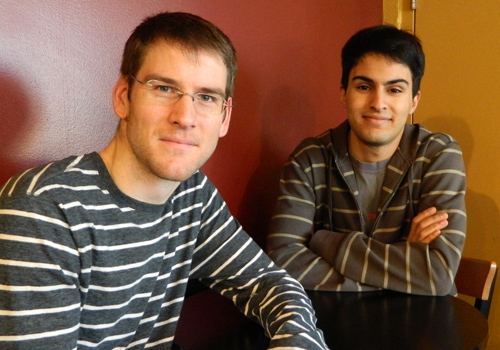
You go to class, work on assignments and discuss the ideas you’ve learned with your fellow students. Education? Most of us take it for granted, even if we complain sometimes about student loans and tough profs.
But what if you were not permitted to attend any public universities because of your religion? What if some other members of your religion started up a school for you and others who shared your faith, but they were arrested and jailed?
That’s the current situation for members of the Bahá’í faith in Iran, says Blair Cameron, a third-year student in applied human nutrition, who is also chair of the Association for Bahá’í Studies on campus.
Renesahba Shahmohamadloo, also a member of theBahá’í faith and assistant chair of the on-campus club, is a third-year toxicology student. His parents, born in Iran, left the country after the 1979 Islamic Revolution and he was born in Ontario. They still have family members in Iran who are unable to attend school because of their faith.
To learn more about this situation, you can attend a screening of the documentary Education Under Fire, co-sponsored by Amnesty International, followed by a discussion, to be shown March 28 at 5:30 p.m. in Thornbrough Room 1200. Visit www.educationunderfire.com for more information.
The Bahá’í religion began in Iran some 160 years ago, explains Cameron, and adherents have faced persecution from the beginning. Members of the Bahá’í faith believe Bahá’u’lláh is the latest of a series of messengers from God sent to educate humanity from age to age. This is the largest minority religion in Iran, with some 300,000 members. That number is only an estimate, says Shahmohamadloo, because since the 1979 Islamic Revolution, Bahá’ís have been unable to track statistics and growth. In Iran, the Baha’i faith is not recognized.
And that’s a major barrier to attending university. Students must identify their religion when they apply, and Bahá’í is not one of the options that can be checked off. But students who deny their religion are at risk of being expelled if they are found out.
In response, the Bahá’í community created the Bahá’í Institute for Higher Education in 1987, which operated in people’s homes; classes were often taught by professors who had been fired from Iranian universities because of their religion. Several of the professors held post-graduate degrees from Canadian universities. Although degrees from this Bahá’í school are internationally recognized, classes had to be held in private homes.
In May 2011, the school locations were raided. A dozen teachers and administrators were arrested and jailed. Seven are still in prison.
Shahmohamadloo feels that international awareness may be an effective way to change this denial of the right to education. He points out that Iran is a signatory to the UN Declaration of Human Rights, which includes education as a basic right. “Although people think the government of Iran doesn’t care, they’ve shown in the past that they are responsive to international pressure,” he says.
Letters of support for the cause have been sent by Nobel Peace Prize winners archbishop Desmond Tutu and Jose Ramos-Horta, among others, and senator Romeo Dallaire spoke at length about the issue in the Senate, describing the situation as “ideological genocide.”
“This is not an attack on the government,” adds Cameron. “We are not calling for a regime change. This is a human rights issue. Access to education is a hallmark of a free society, and I think it is something most people support.”
Their goal is to get at least 500 signatures from University of Guelph students on a letter to be sent to the Iranian government. “We hope many professors will feel moved to write as well,” says Cameron.
For more information about the on-campus Bahá’í association, email bahai@uoguelph.ca.